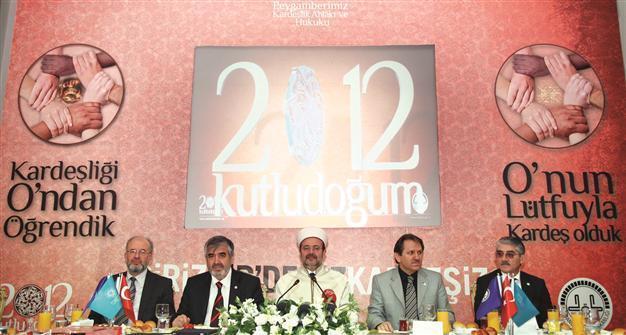Sectarian conflict a power struggle, says Turkey's religious head
ISTANBUL

Mehmet Görmez (C), head of the Religious Affairs Directorate, speaks at a pres confrence yesterday on ‘Holy Birth Week.’ AA photo
Turkey’s top religious official has said the sectarian tension in Muslim countries is in fact a power struggle between different groups, disguised by sectarian differences.“When you carefully analyze the sectarian conflicts in the region, you see the political ambitions of various groups confronting each other in the form of sects,” Mehmet Görmez, head of the Religious Affairs Directorate, told reporters in Istanbul yesterday.
It would not be right to claim that religions and sects lie behind all the problems in the Muslim world, Görmez said. “We are witnessing conflicts between political powers using sects as a disguise, and many Muslims suffer considerable pain,” he said, calling on all citizens to visit Syrian refugees in camps at the Syrian border to demonstrate brotherhood.
The brotherhood Görmez referred to was also the theme of a campaign launched as part of the “Holy Birth Week” celebrations by the Religious Affairs Directorate to mark the birthday of Prophet Muhammad. He said the brotherhood concept in Islam, based on the holy creator, has been long ignored. “At times, we settle for a shallow devotion, when we should include human love in our belief,” Görmez said. “A brotherhood established among Muslims will contribute to the brotherhood of humankind.”
Differences between religions, civilizations and cultures are often used to fuel tension between people, he said, and noted a recent increase in hate crimes, especially targeting Muslims in Europe. “Of course, we should not look for the reasons for such hatred only in Europe, we should be engaged in self-evaluation and be aware of the ways Muslims that contribute to these prejudices.”
Görmez reiterated his call to carefully guard the rights of non-Muslims in the Arab Spring countries. “A church should be free there, as a mosque should be free in Europe,” he said.
















